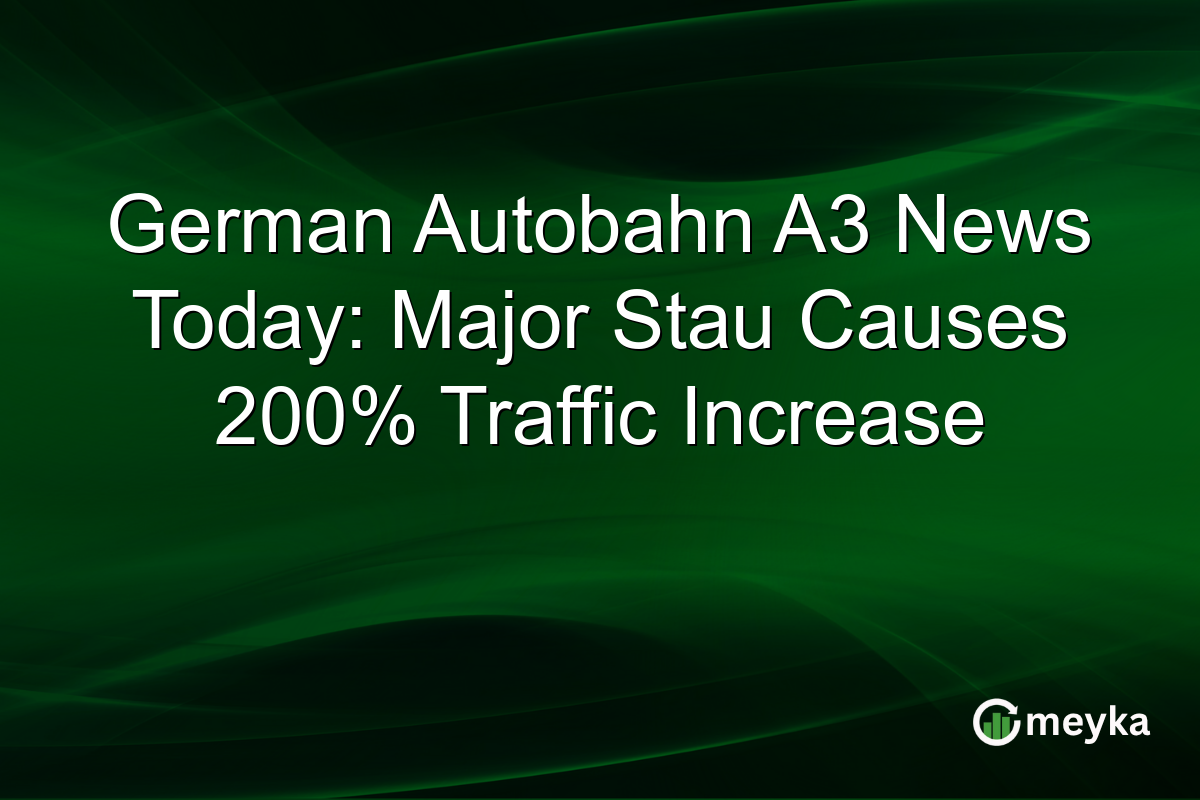German Autobahn A3 News Today: Major Stau Causes 200% Traffic Increase
Today, Germany’s A3 autobahn is making headlines due to an exceptionally severe traffic jam. Known as a ‘Stau’ in German, this congestion has led to a 200% increase in traffic delays. The A3 is a crucial route for logistics and commuting, and this disruption could have widespread impacts. With transport companies and investors on high alert, concerns about potential supply chain disruptions and economic effects are intensifying.
Understanding the Impact of A3 Stau News Today
The A3 autobahn, stretching from the Netherlands to Austria, is a vital corridor for European transportation. Today, an accident has exacerbated traffic, leading to a massive stau. This A3 traffic jam has significantly increased congestion, with volume rising by 200%. The ramifications of this severe disruption are profound for both daily commuters and freight companies. Longer travel times and logistical bottlenecks are becoming a critical issue.
This incident highlights the fragility of just-in-time delivery systems, which depend on timely road transport. Analysts emphasize the necessity for effective traffic management and contingency planning to mitigate such disruptions.
Economic Implications of Road Closure in Germany
The A3 road closure has far-reaching economic implications. Industries relying on efficient transport networks are particularly affected. This German autobahn traffic jam could lead to delays in shipping, affecting supply chains globally. Retailers and manufacturers dependent on just-in-time strategies might face inventory shortages if the disruption continues.
Moreover, with the ongoing blockage, fuel costs and emissions could rise due to idling vehicles. Economists suggest that prolonged delays could stifle regional economic growth, emphasizing the need for robust transportation infrastructure improvements.
A3 Accident Update: Response and Future Measures
Authorities are actively working to clear the accident and alleviate the congestion on the A3. Emergency services, including police and tow trucks, are present to expedite the process. The strategic deployment of resources reflects Germany’s commitment to maintaining its autobahns’ efficiency.
For future prevention, experts propose enhanced traffic monitoring systems and quicker incident response protocols. By investing in road infrastructure and technology, Germany could reduce the likelihood of such severe traffic jams and their economic impact in the future.
Check out this tweet for current updates and local sentiments.
Investor Reaction and Market Sentiment
The traffic jam on the A3 has captured investor attention due to its potential economic ramifications. Transport and logistics sectors may see increased operating costs and logistical issues, affecting their financial health. Investors are closely monitoring updates to gauge longer-term impacts on supply chains.
Current market sentiment on social platforms indicates concerns over prolonged disruptions and their effects on industries relying on the A3. This shows that traffic infrastructure plays a crucial role in economic stability, influencing stock performances indirectly.
Final Thoughts
The massive traffic jam on Germany’s A3 autobahn today underscores the critical nature of efficient transport routes in maintaining economic flow. As industries face potential delays, the importance of investment in road infrastructure becomes evident. Emergency responses aim to clear the congestion swiftly, yet the incident serves as a reminder to bolster our systems against future disruptions. For investors and companies, adopting flexible logistical strategies is vital to navigating such unforeseen challenges. Improving infrastructure and planning is key to minimizing economic impacts of similar events.
FAQs
The traffic jam on the A3 was triggered by an accident, leading to a significant increase in traffic congestion. Emergency services are working to resolve the situation and clear the road.
The jam affects logistics by delaying shipments and potentially disrupting supply chains. Just-in-time delivery systems are particularly vulnerable, causing concern among transport companies.
Authorities have deployed emergency services to clear the incident swiftly. For future prevention, enhancements in traffic monitoring and quicker response protocols are being considered.
The disruption could lead to increased costs and delays in shipments, affecting industries reliant on timely transport. If prolonged, it could hinder regional economic growth.
The incident emphasizes the need for robust transportation infrastructure and contingency planning to prevent such severe traffic jams and mitigate their economic impacts.
Disclaimer:
This is for information only, not financial advice. Always do your research.






